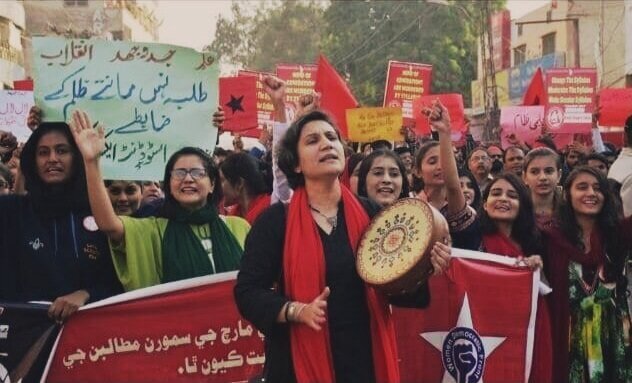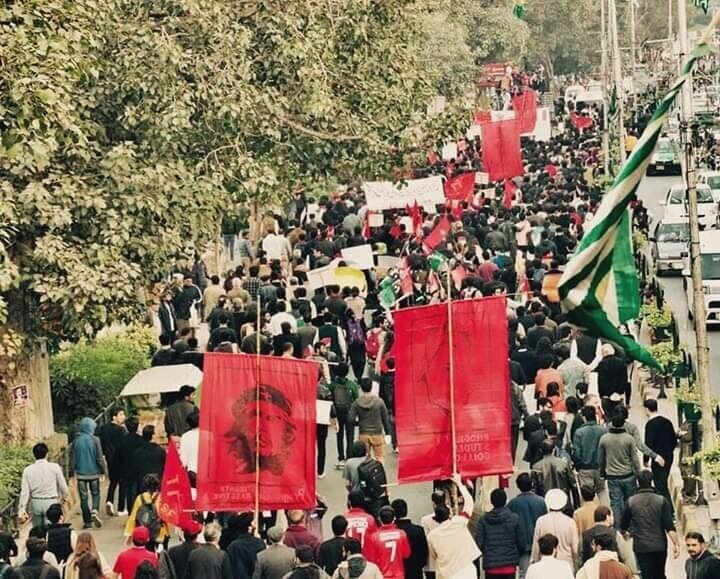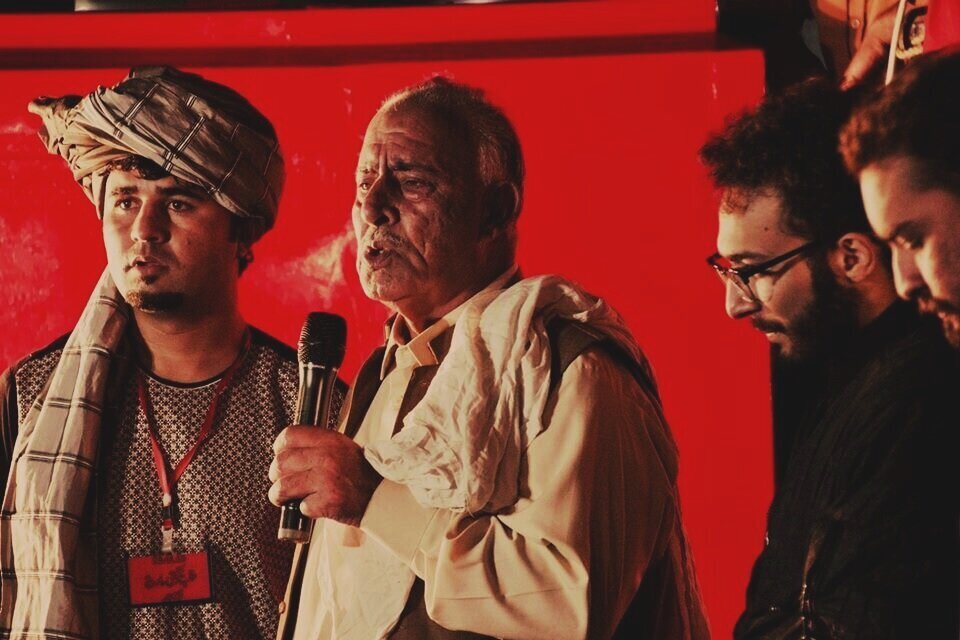Zinda Hain Tulba! / The Students Live!
An energetic national student movement re-emerges in Pakistan
Hundreds turned out for the Students Solidarity March in Lahore, Nov 29th 2019. Photo: Khalid Mehmood
November 2019 marked the 51st anniversary of the student revolts which led to the overthrow of Pakistan’s first military dictator, Ayub Khan, in 1968. Beginning in Rawalpindi’s Gordon College, the uprising soon spread across the country. People were angry at the unprecedented levels of inequality under Ayub’s decade of dictatorship. Workers, students, and farmers soon joined hands to form the Students Action Committee. They led thousands into the streets in a revolt that lasted 139 days, ultimately forcing Ayub to resign.
Nearly a decade later, another military dictator, General Zia ul Haq instituted a complete ban on student unions after he sensed discontent brewing on campuses. While the ban all but suppressed democracy, representation and free expression on campuses, it did not appear to apply to certain right-wing religious organisations, such as the Islami Jamiat Talba (IJT). These have received patronage from powerful quarters in university administrations and the state, effectively being allowed the run of public university campuses, from hiring and syllabus-related decisions to the policing of political and social life.
Not surprisingly, in a country with a massive youth bulge saddled with a necrotic and dictatorial education system, the echoes of student protest are rising again. This November, a Students Action Committee was once again formed in Lahore. The Committee is an alliance of 28 left-wing, nationalist, and students’ organizations across all provinces of Pakistan and its administered areas (Kashmir and Gilgit-Baltistan). Could this herald a renewed unity of progressive forces, reminiscent of the struggle of 1968?
Ibrahim Buriro, a student organizer affiliated with the revamped Students Action Committee, reports from the front-lines.
Crises have been mounting in universities across Pakistan. After a deal with the IMF, the Pakistan Tehreek-e-Insaf (PTI) government elected in 2018 has followed a punishing austerity program, slashing a significant chunk of the already meagre spending on education and health. This has only incentivized universities to boost the already rampant privatization of the education system and launch further fee hikes.
A student holding a banner stating “Degrees are the receipts for the cost of education”, criticizing the commercialization of education in Pakistan. Photo: PRSF Islamabad-Rawalpindi
Recent exposés of sexual harassment and intimidation of students by university administrations, coupled with increasing suicides, rising university fees, crumbling infrastructure and facilities, and surveillance and criminalization of students speaking out against abuse, have brought young people to an impasse.
A student puts up a poster for the Students Solidarity March held on November 29th, 2019 across Pakistan. Photo: Progressive Students’ Collective
As students have repeatedly articulated these concerns over the past few years, university administrations have responded not with structural reforms, but instead with further securitization, policing of student dissent, and rigid moral policing to prevent student interaction and collective action.
We, the students, felt the time had come to free our stifled education system from ageing bureaucrats and their profit-making interests. Twenty-eight progressive students’ organizations across Pakistan and administered regions (Kashmir and Gilgit-Baltistan) formed an alliance, under the revived name of the Students Action Committee. The Committee issued a nationwide call for a Students Solidarity March on November 29th, 2019.
Thousands of students and allies in nearly 50 cities across Pakistan heeded the call to participate in what turned out to be one of the most powerful demonstrations by young people in decades. The charged crowds laid bare the oppression of students by university administrations and state authorities.
Reminiscent of the broad alliances of 1968, the marchers were joined by members of trade unions (such as the Bhatta Mazdoor Union), feminist organisations (such as the Women Democratic Front), and various socialist and progressive nationalist groups. The Young Doctors Association, long vying to take to the streets against privatization of hospitals, were also part of the march.
In charged speeches, students focused on how the nature of our education system, based on class and privilege instead of merit and academic excellence, was producing professionals unable to find adequate employment opportunities. They condemned the mainstream political arena for the absence of genuine leaders from the masses, instead being dominated by the same capitalist and class-based regime that has ruined our education system.
Stage for the Students Solidary March in Islamabad. Banner: End the ban on student unions. Reverse budget cuts to HEC [Higher Education Commission]. Stop the intervention of security forces in educational institutions and recover all missing students. Stop privatization of educational institutions and reverse fee hikes. End the practice of oath taking in educational institutions [mandating the ban on political activity]. Photo: PRSF Islamabad-Rawalpindi
They lampooned university administrations caught perpetrating and covering up horrific instances of sexual abuse, blatant corruption, unrestrained privatization, and misappropriation of student funds and university resources.
Most of all, they insisted that students must be represented in the system to which they are party, demanding the reinstatement of students’ unions, a right guaranteed by the Constitution.
Women leading the Students Solidarity March in Hyderabad. Photo: DAWN
The presence of women at the forefront of the Students Action Committee and the march did not go unnoticed. Right-wing circles were in uproar as young women were seen reclaiming public spaces in ways that challenged not only the power of university administrations and the state, but also patriarchal norms and practices. It sparked relentless misogynistic attacks, especially online, where the organizers were first dismissed as burger bachas [elites], and when that was disproved, as being anti-state and threats to society.
The uproar was also due to the fact that both social and mainstream media spaces are heavily dominated by right-wing and state-backed forces. These spaces have for the first time encountered bold left-wing ideas gaining popularity among the young. Funnily, men who have made careers out of CIA-backed petrodollar jihad were seen hopelessly conjuring CIA conspiracies and peddling fears in an attempt to dismantle new ideas which are attracting youth in an otherwise dead intellectual environment.
Public meeting to mobilize students for the Students Solidarity March in Peshawar. Photo: Pakhtunkhwa Ulasi Tehreek
The success of the march was down to the hard work of different student groups patiently organizing students over many years. This year alone, students mobilized in large numbers over multiple issues, including rampant sexual harassment (especially at University of Balochistan), lack of clean drinking water on campuses (Sindh), sudden fee hikes, and student evictions from university hostels.
But the issue gained national notoriety when a video of female student leader Arooj Aurangzeb chanting slogans to mobilize students in Lahore went viral on social media. While her leather jacket and chants of Laal o Laal Salam [Red Red Salute] were met with derision and ridicule from the expected reactionary quarters, the publicity also galvanized a huge section of students increasingly sympathetic and receptive to progressive ideas.
The march was attended by various left organizations who saw the struggle to reinstate student unions tied to the struggle against imperialism and capitalism. Students carried banners calling for the reinstatement of student unions as well as opposing the IMF. Photo: Javaria Waseem
Scenes from the march
In Karachi, the march was led by Student Action Committee-Sindh, an alliance of organizations that includes the Progressive Students’ Federation (PRSF)-Karachi. Its leaders campaigned for over a month, reaching out to students and student organizations at nearly every university and college in the city. With hundreds of students turning out, this year’s Students’ Solidarity March was one of the biggest students’ marches Karachi has seen in recent decades. Students affirmed their collective cause to challenge privatization and commodification of education, surveillance and harassment on campuses, and their right to space for critical discourse and creativity.
In Hyderabad too, close to a thousand students marched for their demands. Similar marches were held across Sindh, including Larkana, Ghotki, Mirpurkhas, Dadu, Noshero feroz, Badin, Moro, Kamber, and Khairpur University.
Students in Lahore marching with banners of Che Guevara and Bhagat Singh. Photo: Khalid Mehmood
Lahore saw one of the biggest marches in the country, under the leadership of the Students Action Committee, Progressive Students Collective and other organizations. Radical songs, slogans, and speeches echoed into the evening with participants reiterating their demands and expressing solidarity with the concerns of students from all over the country studying in Lahore’s public universities. In Punjab, large marches were also organized by students in Multan and Bahawapur.
A scene from the Student Solidarity March in Lahore. Photo: Javaria Waseem
The University of Baluchistan was recently at the centre of an outrageous sexual harassment scandal which shocked students across the country. It emerged that the university administration was sexually harassing and blackmailing female students, using footage from CCTV cameras installed under the pretext of campus security. Such policing and monitoring of students under the pretext of security concerns is nothing new. Shamefully however, rather than taking action against the perpetrators exposed, the university administration came up with the absurd solution to ban “political activities” on campus and impose a mandatory uniform on students. Quetta saw a strong turnout for the March, with students stressing upon the need for safe and free campuses in a region already struggling with one of the lowest rates of female education.
Students Solidarity March in Quetta, Balochistan was also attended by families of missing students. Photo: BSO
The twin cities of Rawalpindi and Islamabad once again saw hundreds of students take to the streets. Students recounted incidents of grave injustice, including recent evictions of students to build private hospitals by the Capital Development Authority, and the death of a Bahria University student who fell from the 4th Floor of a building due to administrative negligence.
Scenes from the Students Solidarity March in Islamabad, November 29th 2019. Photo: PRSF Islamabad-Rawalpindi
The revolutionary theatre group, Laal Hartaal staged a theatre performance, 'Student hoon Janaab' [I am a Student, Sir]. It depicted the many problems faced by students, including academic stresses, extreme parental pressures, and looming unemployment. It also addressed how reckless privatization has commodified education in Pakistan, and pushed it beyond the reach of most working and middle class students. The play criticized the fact that administrations routinely ignore and abuse students, prevent them from talking about and organizing around their problems, and criminalize their protests. And it paid tribute to the many students who have died or committed suicide overwhelmed by these problems, including Haleema (Bahria University), Inam (Comsats University), Namrata (Bibi Asifa Dental College Larkana), Saqib Hakro (Bahria University), Naila Rind (Sindh University) and Mashal Khan (Abdul Wali Khan University).
Theatre performance by Laal Hartaal at the Students Solidarity March in Islamabad. Photo: PRSF Islamabad-Rawalpindi
The role of slogans in mobilization
A charged crowd at the Students Solidarity March, Lahore. Photo: Khalid Mehmood
The slogans that attracted people towards our cause were especially revealing. In the mobilization efforts of which I was a part in Islamabad, we went to several universities, colleges, and public spaces. We chanted, “Taleem bachane nikle hain; aao hamare sath chalo!” [We march to save education; come march with us], and “Union ke khatir nikle hain; aao hamare sath chalo!” [We march for the sake of unions; come march with us]. This slogan (“aao hamare saath chalo”) has become very common in major cities of Pakistan and attracts a lot of people.
However, I noticed that forming connections across gender and ethnic identities remains a challenge for the left. We must develop new and creative methods of mobilization that can attract and welcome diverse groups of people. At the Lok Virsa fair, an annual cultural festival held in Islamabad, we attracted many people by playing drums with Laal Hartaal dancing and chanting slogans which resonated with people. However, many people did not understand slogans such as, “Asia surkh hai” [Asia is red] and “Laal laal lahraaye gaa” [The red, red banner will rise]. The de-politicization of multiple generations after the fall of the Soviet Union and the end of politics along Left-Right ideological lines has distanced young people from politics, which is now considered a dirty word in mainstream discourse. But the mounting crisis in the country is increasingly uniting people, with students at the centre as they are rapidly failed by the education system. Organizing of students under progressive and leftist students’ organizations augurs a brighter future for Left politics in the country.
As a student who has been organizing around these issues for a number of years, I remember that, before, only a few people would attend our protests demanding the reinstatement of student unions. But committed and consistent work is now bearing fruit. The contradictions of this cruel system and the increasing oppression of all marginalized communities is bringing people together to demand a new and better future for everyone in this country. Over the past two years, not just young people, but many sections of Pakistani society have been mobilizing, as we can see with the Aurat (Women’s) March, the Pashtun Tahaffuz Movement (PTM), the Climate March, and protests in all provinces for the release of thousands of missing persons. If these groups unite to work together, the very foundations of this unjust and unfair system will be shaken.
The aftermath
The Student Solidarity March of 2019 has shifted the terms of debate in state and society. Since the march, protests have continued in different cities, in defiance of threats and intimidation. In Buner, a region in the Khyber Pakhtunkhwa province, college students protested for three days against fee hikes, while hundreds of students from Gilgit-Baltistan’s Karakoram International University blocked the China Pakistan Economic Corridor (CPEC) in protest against the cancellation of a fee reimbursement program by the federal government. The cancellation has skyrocketed tuition fees for nearly 1000 Masters and PhD students who already have limited access to education in this severely underdeveloped region.
Students protest against discontinuation of federal fee rebate program in Gilgit-Baltistan, Nov 2019. Photo: NSF Gilgit-Baltistan (GB)
Meanwhile, the provincial cabinet in Sindh has passed a resolution to restore student unions while the Punjab Assembly has declared its support for student unionization. The federal parliament has also indicated its interest in overturning the ban on union activity. Yet at the same time, in an astounding move, the state has charged various participants of the Student Solidarity March with anti-state activities and sedition, ironically under colonial-era laws. These events would be farcical if they weren’t so outrageous: sedition levelled against university professor Ammar Jan who never addressed the march, and the magnanimous Iqbal Lala, who called for peace after the lynching of his son Mashal Khan over false allegations of blasphemy. One of the accused, Alamgir Wazir, was abducted by state forces from the Punjab University campus even before charges were filed and remains in custody. These events are a resounding indictment of state and university institutions and a revelation of their disarray. They do nothing but demonstrate the grievances of the marching students in practice.
Iqbal Lala, father of slain student activist Mashal Khan, is facing charges of sedition for addressing the peaceful students’ march in Lahore. Photo: Khalid Mehmood
The Students Action Committee is now fighting the cases of sedition in court, and acting to ensure that the drafting of policies or codes of conduct for student unions will also take students’ voices on board. Regardless, in the form of the Students Action Committee, the show of strength and unity by students across the country suggests the possibility of a new era of progressive politics in Pakistan.
Ibrahim Buriro is an M.Phil Student at Sindh Madressatul Islam University, Karachi. He is also affiliated with Progressive Students Federation and Awami Workers Party.




![Stage for the Students Solidary March in Islamabad. Banner: End the ban on student unions. Reverse budget cuts to HEC [Higher Education Commission]. Stop the intervention of security forces in educational institutions and recover all missing student…](https://images.squarespace-cdn.com/content/v1/6029d50f0b4b332aaec50a8c/1613923386701-L9WHXO802SYXNMYOHJM0/ssm%2BISlamabad.jpg)










